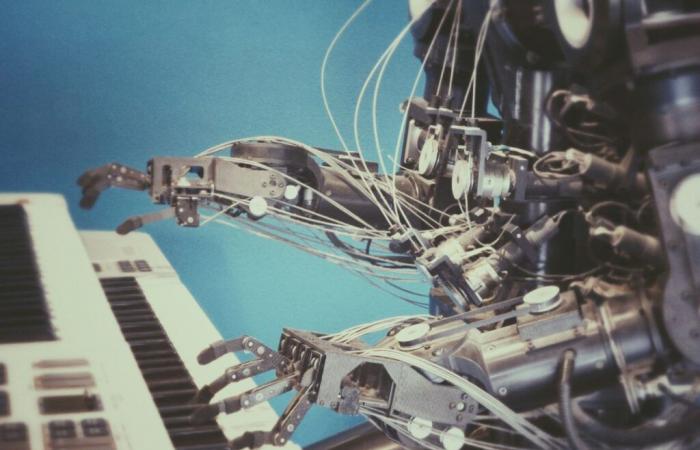Are we heading towards a musical world without an author, without a composer and without a performer, mainly created by generative AI? This is the great fear of songwriters whose European defenders have just published a manifesto this Monday, October 21. The European Alliance of Composers and Authors-Composers (Ecsa), which brings together associations of creators (lyricists, composers, etc.) in the music sector, want to impose “ consent, transparency and remuneration », each time a piece of music has been “ingested” by a generative artificial intelligence (AI) tool.
The organization believes that music authors are not sufficiently protected against generative AI: a point of view shared in France. Last week during Mama, the annual music industry festival, Cécile Rap-Veber, general director of Sacem, estimated that “ Generative AI is a massive looting of all the works of human creators, without any remuneration in return ».
Also read: Copyright: where are we in the battle between creators and artists and AI developers?
Songwriters whose “survival” is today “increasingly difficult”
Not only does generative AI sometimes make it possible to reuse known voices without authorization, but it makes it possible to generate dozens of pieces in a few prompts – enough to dilute the offer proposed by artists in the flesh, the creators explain in substance of the sector. LThe Alliance of European Associations calls on Brussels to keep its commitments and go further than what is currently provided for in the European regulation on AI (the AI Act). The text will require AI developers to publish a detailed summary of the works that were used to train their tools.
Because today, creators are “ unable to obtain fair remuneration from the exploitation of their works », Explains the ECSA. Not only are they faced with “ the use of their works by Al’s suppliers without their consent “, but they also have to face ” paltry streaming royalties, unfair contracting practices and a widespread lack of transparency and accountability in the music industry “. Result : ” (their) survival increasingly difficult, even for music authors whose works are appreciated around the world », Regrets Helienne Lindvall, president of ECSA, quoted in the press release.
The organization therefore asks the European Commission, through its 19 recommendations, to include these principles of transparency and fair remuneration in the AI strategy for the cultural industries, while settling accounts with streaming, a market that it must ” fix “. The association also demands that Brussels define a European strategy for the sector, with the obligation to put in place fairer contracts for creators.
Artists stand up against AI
In recent months, calls to better protect artists and songwriters from AI have increased. Last April, Billie Eilish, Stevie Wonder, Norah Jones, just like the heirs of Frank Sinatra and Bob Marley, explained, in an open letter, that AI constituted a threat that could “ destroy the music ecosystem “. Last June, it was the American union of music publishers, the Recording Industry Association of America (RIAA), which accused Uncharted Labs (Udio AI) and Suno AI of “ steal an artist’s works ».
In return, Suno AI, which allows music to be generated using a few prompts, recognized that it had trained its tool well on pieces protected by copyright. But the start-up believes that in the United States, it remains legal under what is called “fair use”.
Also read: The American recording industry files a complaint against two AI startups
The implementation of the “opt out”
In France, various measures have been taken so that AI systems stop “looting” existing works, to train their AI, according to the creators. On October 18, the Heritage Film Catalog Union (SCFP), which represents audiovisual works released more than 10 years ago, announced that “opt-out” was now the industry standard.
Translation: any AI system will first have to obtain their agreement to reuse any content from their films (scene, images of the actors, music, etc.). CUPE also advocates the establishment of a “ framework for continuous dialogue allowing us to work on solutions “. The objective: to remunerate the rights holders, when the latter have given their agreement for the reuse of certain parts of a work.
Also read: Cinema: how the world of dubbing is trying to stem its “looting” by AI
Similar measures have also been taken by other creative sectors (via the SACD, which represents multimedia authors, or the DVP, the press). Sacem, which defends the rights of music creators in France, also made any collection of pieces for AI training subject to prior authorization last October.
???? To not miss any news from 01net, follow us on Google News and WhatsApp.
Source :
ECSA manifesto of Monday October 21, 2024






